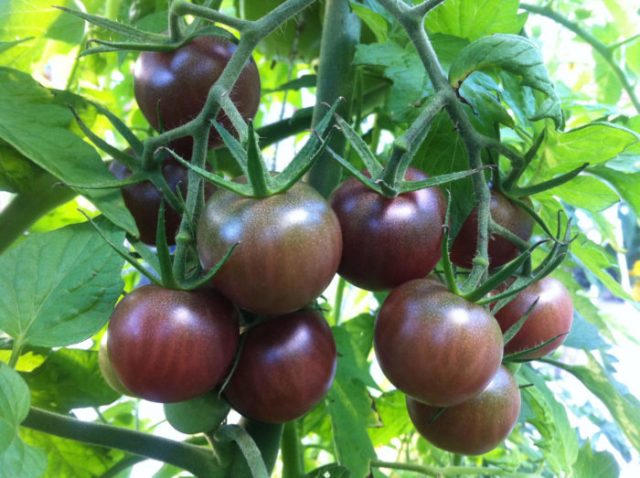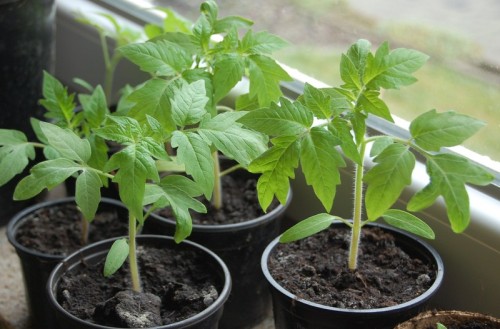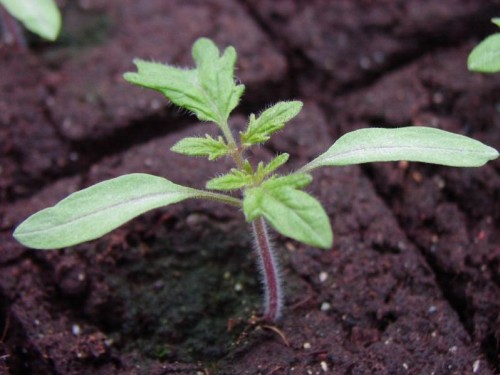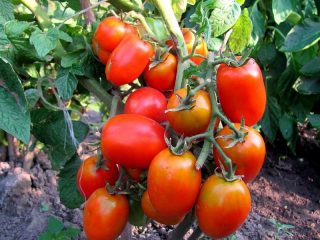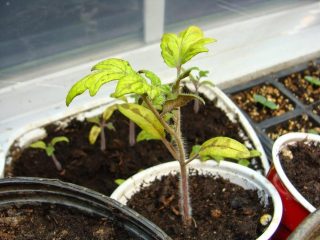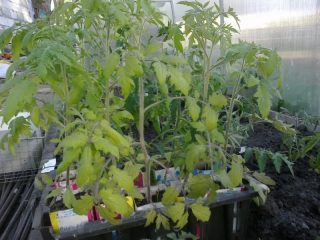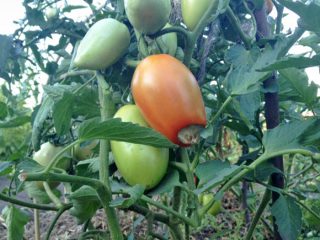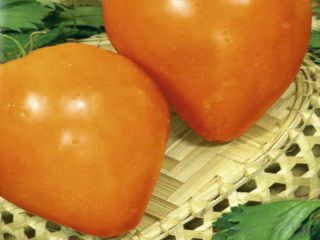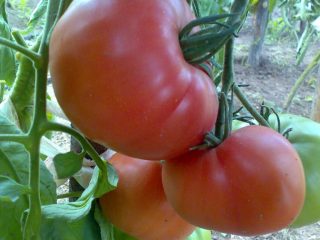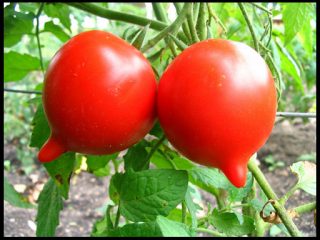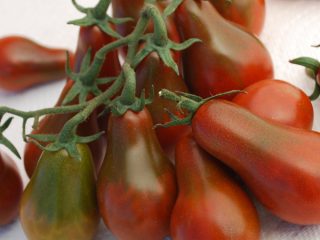Content
The Dark Chocolate tomato is a medium-ripening cherry variety. This variety was bred not so long ago, so it can still be perceived as a kind of exotic, however, caring for the variety differs little from other species of the mid-season group.
The Dark Chocolate tomato was included in the State Register and adapted for cultivation in greenhouse conditions in all regions of Russia in 2007.
Description of the tomato variety Dark Chocolate
The Dark Chocolate variety is an indeterminate type of tomato. This means that the plant is not limited in growth, although the average height of the bushes is 1.5-1.7 m. In appearance, they resemble vines entangling supports. Such sizes require the obligatory formation of tomatoes and gartering of shoots. As a support, trellises are best suited, to which the tomatoes are attached using twines.
The fruits of the variety are small. They form clusters of 8-12 fruits each. This density of growth ensures high yields of tomatoes, despite the fact that they themselves are small in size.
Description and taste of fruits
Translated from English, cherry means “cherry,” which is quite consistent with the appearance and size of the fruits of the Dark Chocolate variety. The weight of tomatoes rarely exceeds 30 g.
The shape of the fruit is round, without pronounced ribbing. Their color is almost uniform, except for a small greenish spot on the stalk. The color of the tomatoes is dark brown, with a barely noticeable purple tint.
The pulp of the Black Chocolate variety of tomatoes is juicy and dense, the fruits are two-chambered. The skin of the fruit is elastic, but quite delicate, so tomatoes should be transported carefully to avoid cracking of the harvested crop.
Reviews often emphasize the pleasant taste of the fruit. Dark chocolate tomatoes are moderately sweet, not cloying, but with a slight sourness, which harmoniously combines with the sugar content of the pulp. The rich taste of the fruit is also noted, which contains fruity notes. This is explained by the unusually high concentration of sugars and acids in the pulp of tomatoes.
This variety of tomatoes is of little use for harvesting for the winter. The skin of the fruit easily cracks during preparation for preservation, as a result of which the pulp softens and the contents of the tomatoes come out. This is a cocktail type variety. Most of the harvest is consumed fresh and added to salads.
Characteristics of tomato Black Chocolate
According to the information from the description of the Dark Chocolate tomatoes, it is a mid-season variety, the sowing of which is recommended to begin on March 15. The deadline is March 20-22. Planting in a greenhouse takes place on average 2 months after the first shoots appear.
Tomatoes ripen in 110-120 days, if you count from the day the first shoots appear. The yield of one plant reaches 4-5 kg.
One of the key features of the variety is excellent immunity to diseases typical of tomatoes. On the other hand, disease prevention is never superfluous.
Pros and cons of the variety
Dark chocolate tomatoes have many positive characteristics:
- exotic type of fruit;
- rich sweet taste and aroma;
- high yields - from 4-5 kg per plant and above with good care;
- ability to ripen after harvest;
- ease of care;
- resistance to most diseases that are typical for tomatoes;
- good responsiveness to feeding.
The variety is not without its drawbacks. These include the following qualities of this variety:
- heat-loving – tomatoes Dark chocolate is almost impossible to grow outside greenhouse conditions;
- tomatoes are of little use for preparing for the winter;
- transportation of fruits involves careful packaging of the crop to avoid cracking of the skin;
- the need to form bushes;
- obligatory garter.
Some disadvantages of the variety are quite questionable, since they require basic procedures for caring for tomatoes, typical of many varieties.
Rules for planting and care
Growing Dark Chocolate tomatoes is not much different from caring for other hybrids and medium-ripening varieties.Agricultural technology for planting and subsequent care of tomatoes provides standard procedures:
- installation of supports;
- introduction of fertilizing;
- regular watering;
- stepsoning;
- preventive disinfection of soil for seedlings and plantings.
Growing seedlings
Before sowing seeds, it is recommended to check the planting material for germination. To do this, you need to put the seeds in a glass or plate of water for half an hour and watch how they behave. Floated seeds are unsuitable for sowing. Those that have sunk to the bottom are dried and then treated with substances to stimulate growth.
Growing Black Chocolate tomato seedlings is carried out according to the following scheme:
- Before planting seeds, the soil is disinfected for preventive purposes with a weak solution of potassium permanganate.
- Then the soil must be fertilized with fine-grained river sand, humus and peat, taken in equal quantities.
- Planting material is placed in the ground at a distance of 2 cm from each other.
- After this, the seeds are lightly sprinkled and watered, but moderately, so as not to wash off the planting material.
- The planting procedure is completed by placing a shelter - glass or plastic film.
- When the first shoots appear (after about 4 days), the shelter is removed. The container with seedlings must be moved to the windowsill.
- Throughout the growth of tomatoes, seedlings are regularly watered, focusing on the condition of the soil surface. It shouldn't dry out. Cold water should not be used for irrigation.
- When the tomatoes form 3 leaves, they are planted in separate containers. In this case, you should carefully move the roots of the seedlings; they should not be damaged.
Transplanting seedlings
Dark chocolate tomatoes are transplanted into the greenhouse starting in the second ten days of May, when the soil has warmed up sufficiently. Recommended planting scheme: 3 bushes per 1 m2. Plants are placed at a distance of 45-50 cm from each other. It is not recommended to thicken the plantings, since when tomatoes are located close together, they quickly deplete the soil, which affects fruiting - the tomatoes begin to become smaller and lose the sugar content of the pulp. In addition, when thickening, there may be a lack of light, which also inhibits the growth of tomatoes.
The procedure for planting seedlings looks like this:
- Use a small garden shovel to dig shallow holes.
- Fertilizer is placed at the bottom of each hole. Nitrophoska is suitable for these purposes, no more than 1 tsp. into each hole. Fertilizer is mixed with soil and watered.
- A support about 1-1.5 m high is installed near one of the walls of the pit. If you drive it into the ground after planting, you can damage the root system of the tomatoes.
- Then the seedlings are removed from the containers, carefully holding the earthen ball so that it does not fall apart.
- The seedling is lowered into the hole and covered with earth. Additionally, you can dilute the soil with peat and humus with the addition of sand.
After planting the tomatoes, it is recommended to leave them alone for 3-5 days. At this time, watering is not carried out for better survival of tomatoes. The first feeding is carried out only 3 weeks after planting.
Tomato care
Tomatoes of the Black Chocolate variety should be grown taking into account the following recommendations:
- Tomatoes must be tied to supports.The leaves and fruits of tomatoes should not lie on the ground, otherwise the process of decay will begin, which can lead to the death of the entire bush. Fruit branches without a garter may break under the weight of tomatoes.
- Stepchildren, except for the strongest one, which is located after the first flower cluster, are cut off. Tomatoes of this variety form 1-2 stems. The lower leaves are torn off as the tomatoes ripen. If this is not done, the plant will expend energy on the formation of foliage and the development of stepsons.
- Water the Dark Chocolate variety at intervals of 2-3 days. Plantings should not be flooded.
- It is advisable to mulch the soil under the bushes. Mulch prevents the growth of weeds and promotes better moisture retention after watering.
- Feed tomatoes once a week, no more often. To do this, it is better to use organic fertilizers: bird droppings, crushed chalk, ash, superphosphate, nitroammophoska. Small-fruited varieties react poorly to feeding with mullein. A mixture of ash (1 l) and superphosphate (2 tbsp.) has proven itself well.
- Fruiting is positively affected by the addition of a mixture of urea (1 teaspoon of urea is diluted in 10 liters of water) or iodine (10-12 drops of the substance are dissolved in 10 liters of water diluted with 1 liter of whey).
- It is not recommended to feed chokeberry varieties with mineral fertilizers.
- If the tomatoes change color to pinkish or light brown, it means that the acid-base balance of the soil needs to be adjusted. To do this, you can sow peas or mustard between the beds. In addition, the condition of the soil can be improved by adding chalk and ash to the ground in a proportion of 1-2 tsp. for 1 tomato bush.
- When tomatoes bloom, it is advisable to gently shake the bushes from time to time.This is done to ensure that the plant sets the maximum number of fruits.
- To prevent fungal infections, it is recommended to treat plantings once every 2 weeks with a yeast solution. For this, 10 tbsp. l. sugar and 1 packet of yeast are diluted in 10 liters of infused water. No more than 1 liter of solution is used for 1 bush. It is applied at the root or sprayed on bushes.
You can learn more about the properties of black tomatoes, as well as the peculiarities of their cultivation, from the video below:
Conclusion
The Dark Chocolate tomato, despite the relative youth of the variety, has already won the recognition of summer residents due to its unpretentiousness and resistance to diseases typical of tomatoes. Particularly attractive is the exotic appearance of the fruit and the unusual rich aroma due to the high concentration of sugars in the pulp. The Dark Chocolate tomato has no obvious disadvantages; however, it is not suitable for planting in open ground, which some consider to be a disadvantage of the variety.
